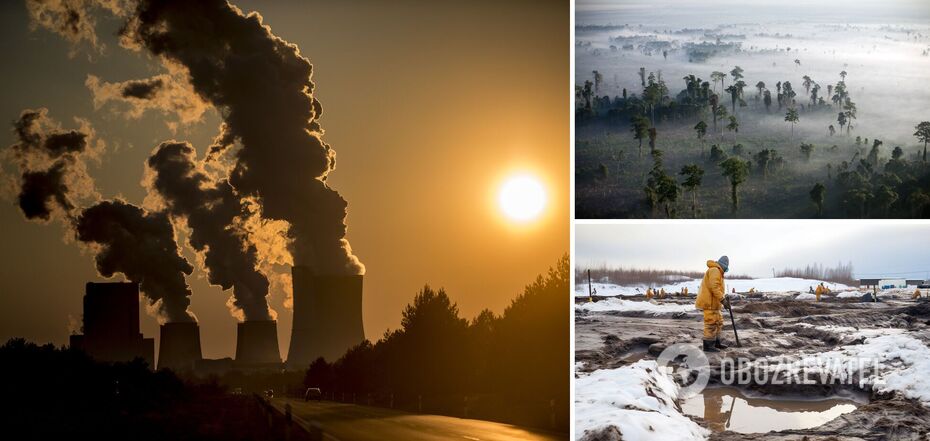Life
Humanity pushed the Earth to its limits: scientists say it's not a "heart attack" yet, but everything is very concerning
Planet Earth is now in such a damaged state that it can no longer be considered a safe operating space for humanity. Six of the nine "planetary boundaries" have been breached due to human-induced pollution and destruction of the natural world.
This is stated in a scientific article published in Science Advances. Breaching the boundaries means that systems are no longer safe and stable.
Planetary boundaries are the limits of key global systems, such as climate, water and wildlife biodiversity, beyond which their ability to maintain the health of the planet is at risk of being compromised.
If these boundaries are breached, it means that the systems have moved far from the safe and stable state that existed from the end of the last ice age, 10,000 years ago, to the beginning of the Industrial Revolution, the period when all modern civilization emerged.
According to the researchers, their assessment is "the first scientific check on the health of the entire planet." They clarified that in addition to the six thresholds that have already been passed, two more are close to being breached. We are talking about air pollution and ocean acidification.
The only boundary that is currently in a safe state, according to the researchers, is atmospheric ozone. The condition of this boundary has improved significantly after humanity has abandoned destructive chemicals in recent decades, contributing to the reduction of ozone holes.
The scientists called the fact that all four biological boundaries that encompass the living world have reached or will soon reach the highest level of risk called the "most alarming." This is worrying because the living world ensures the sustainability of the planet. In particular, plants absorb carbon dioxide emissions.
Scientists explain that planetary boundaries have no return points and once they are breached, the risks of fundamental changes in the physical, biological and chemical life support systems of the Earth increase significantly.
According to The Guardian, Professor Johan Rockström, who once headed the team that developed the boundary system, noted that "the decline in the planet's stability" is of great concern to scientists.
According to him, violation of the boundaries can lead to a loss of sustainability, as a result of which humanity will not achieve the goal of limiting global warming to 1.5°C, which will bring the world closer to real turning points.
For her part, Professor Kathryn Richardson of the University of Copenhagen, who led the study, noted that scientists know that humanity can thrive under the conditions that have existed on Earth for 10,000 years for sure, but "we don't know if we can thrive under significant, dramatic changes."
Comparing the Earth to a patient with very high blood pressure, the professor noted that the state of the planet "does not indicate a heart attack, but it does increase the risk significantly."
The study indicates that the boundary of the biosphere's integrity, which includes the healthy functioning of ecosystems, was violated in the late 19th century when wildlife was destroyed. Massive deforestation also resulted in the land use boundary being breached in the last century.
The safe limit of climate change was exceeded in the late 1980s.
As for freshwater, a new indicator that takes into account both water in lakes and rivers and in the soil showed that this limit was crossed in the early 20th century.
Another boundary is the flow of nitrogen and phosphorus in the environment, which are vital for life. According to the Food and Agriculture Organization of the United Nations, nitrogen is applied to fields three times as much as is needed every year.
The limit for synthetic pollution, such as pesticides, plastics and nuclear waste, has also been passed.
The limit for air pollution, which affects plant growth and monsoon rains, is still being held at the global level, but it has already been breached in South Asia and China.
Ocean acidification is also estimated to be worsening and close to exceeding the safe limit.
Summarizing the current situation on the planet, Rockstrom noted that "if you want to have security, prosperity and justice for humanity on Earth, you have to get back to a safe space, and we are not seeing that progress in the world at the moment."
Phasing out the burning of fossil fuels and ending destructive agriculture are key actions needed.
Professor Simon Lewis of University College London, who is not a member of the research team, said, "This is a strikingly grim addition to an already worrying picture. The planet is entering a new and much less stable state. This could not be a starker warning of the need for profound structural changes in our relationship to the environment."
Earlier OBOZREVATEL reported that global warming could kill a billion people in 100 years.
Subscribe to OBOZREVATEL on Telegram and Viber to stay up to date with the latest news.



























